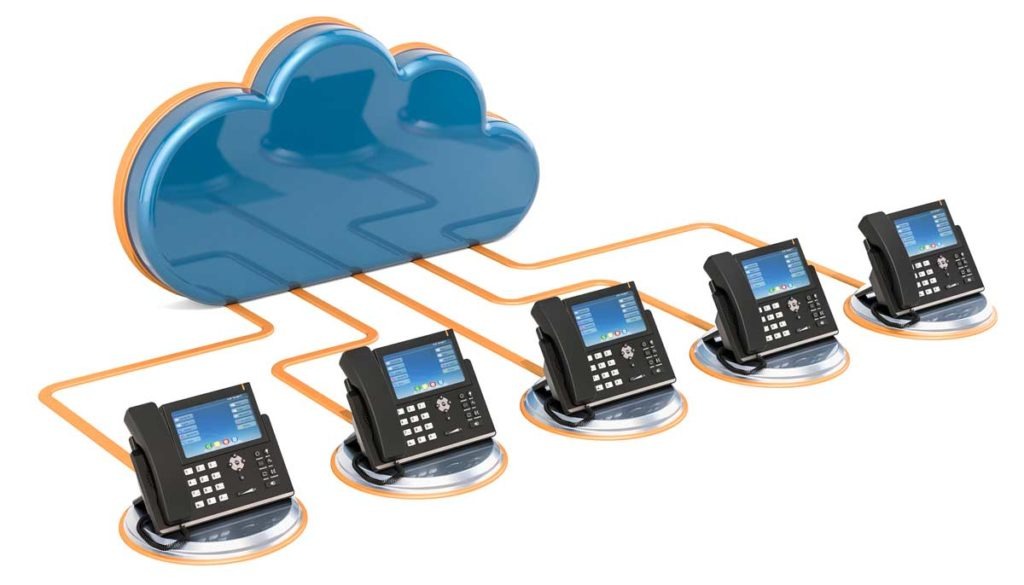Cloud computing is advancing today’s enterprises by providing more agile and cost-effective solutions. Business communications, as a critical pillar of any organization, is also embracing this innovation. Cloud voice solutions are increasingly being offered by service providers to businesses of all sizes. This post will lead you through the cloud phone system, explaining what it is and how it works, as well as why and how to choose one.
Contents
What Is a Cloud Phone System?
A cloud phone system is a commercial telephone platform based on Voice over Internet Protocol that is hosted and controlled by a telecom provider such as NUACOM. A Cloud Phone System (also known as a Cloud VoIP system, Hosted PBX, Hosted VoIP system, and Hosted Phone System) typically provides advanced features and scalability that an on-premise phone system does not, such as integration with business, multi-location access, remote worker mobility, click-to-call, and many other functionalities.

You may now handle all of your corporate communications in a new way thanks to cloud technology. Data is kept on a computer and can be accessed via the internet, mobile devices, and desktop computers. This implies that there are no longer any constraints to using landlines, and your firm may expand at any time, anywhere, using the same technology that handles your business telephony.
Benefits of a Cloud Phone System
Savings on expenses
Every business, especially small businesses, strives to reduce operational costs as much as possible. A cloud phone system is a cost-effective alternative because it eliminates both upfront equipment expenses and ongoing maintenance costs.
The only capital investment in most cloud phone system setups is the purchase of IP phones. The cloud phone system is often priced per user, allowing organizations to increase capacity by simply acquiring additional licenses. The system is constantly ready to expand along with your company. On the other side, with this price model, the corporation has greater predictability of its phone system and better budget control.
Scalability
The ability to scale efficiently is a significant benefit of adopting this type of company phone system. As your company expands, your cloud phone system can scale to keep up. If you want to scale up traditional phone systems, you’ll need to buy more hardware.
However, with cloud-based phone services, it is as simple as adding additional customers, whether they work in a real office or remotely. This makes it one of the best phone services for businesses, particularly ones that are rapidly expanding.
Maintenance and administrative requirements are minimal
A cloud phone system is hosted off-site and maintained centrally by phone service providers, requiring little technical skills and IT employees from clients to set up and configure the system. The burden of maintaining the system up to date also passes from the consumer to the service provider, and organizations can have an always-up-to-date phone system without devoting funds and resources to it.

A cloud phone system’s administration is also simplified as long as you have an Internet connection, which is especially handy for businesses with offices in multiple locations. IT administrators can alter user settings via the web interface at any time, from any location, with a few clicks.
Mobility and geographic adaptability
Headquarters, branch offices, and teleworkers can all be unified with a cloud phone system, enjoying the same advantages and business continuity. For remote workers, the office is wherever they make it as long as they have an Internet connection.
Some cloud phone system service providers provide free softphone programs that allow employees to utilize computers and cell phones as office extensions to make and receive calls, allowing them to work from home, on the go, or as full-time remote worker.
Furthermore, cloud phone systems make it simple to connect geographically distributed offices under one phone system, and the administrator can control it from anywhere.
Features of Cloud Phone System
Leading cloud phone service providers include unlimited advanced services like auto attendants, conference calls, voicemail, and call queues in your monthly subscription. For your convenience, the following are some of the most popular functions of Yeastar Cloud Phone System, and you can watch the movies to learn more:
Call Rerouting
Call forwarding is a basic function of a phone system that allows an incoming call to be routed to a specific destination under various conditions such as “When Busy”, “No Answer”, and “Always”. You can, for example, choose not to answer a call and instead forward it to a colleague or to voicemail.
AutoCLIP
AutoCLIP is a wonderful tool for dealing with returned calls. Here’s the situation. A salesman called his client, but the phone was not answered. His client called back a few minutes later. Because his information has been saved, his call will be sent immediately to the salesman.
Forking SIP

The process of “forking” a single call to several SIP endpoints is referred to as SIP forking. Numerous SIP endpoints can be registered to one extension number using SIP Forking so that an incoming call can ring multiple terminals at the same time and you can take the call from any of the devices.
Ring Organization
Ring Group is used to properly divide calls among personnel in specific departments. When a call comes in, all phones in the group ring sequentially or concurrently, depending on the ringing strategy you choose.
Identical Ringtone
Distinctive The ringtone identifies calls from various inbound routes. Calls from various inbound routes will play their unique pre-programmed ringtones. When a user hears the ringtone, he or she may become aware of the nature of the incoming call.
